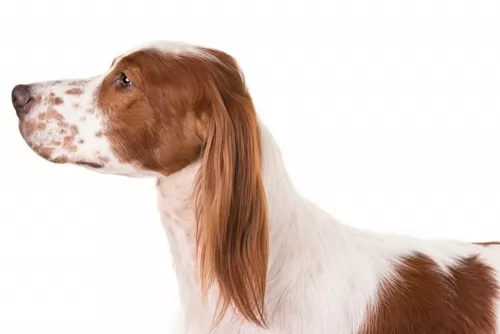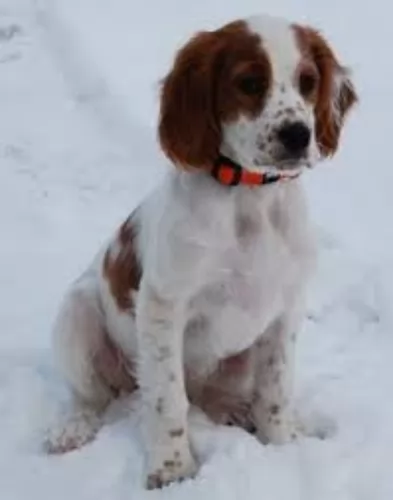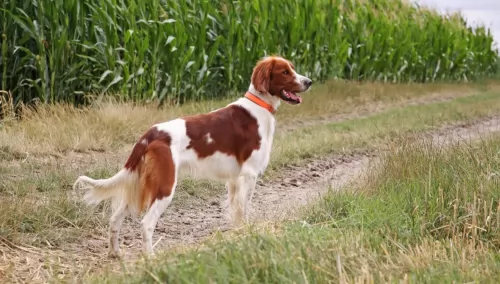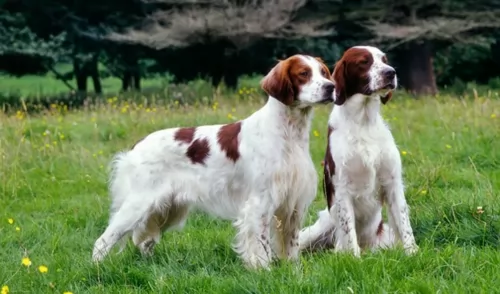 Petzlover
Petzlover Grand Bleu de Gascogne is originated from France but Irish Red and White Setter is originated from Ireland. Grand Bleu de Gascogne may grow 11 cm / 5 inches higher than Irish Red and White Setter. Grand Bleu de Gascogne may weigh 8 kg / 18 pounds more than Irish Red and White Setter. Both Grand Bleu de Gascogne and Irish Red and White Setter has almost same life span. Grand Bleu de Gascogne may have less litter size than Irish Red and White Setter. Grand Bleu de Gascogne requires Low Maintenance. But Irish Red and White Setter requires Moderate Maintenance
Grand Bleu de Gascogne is originated from France but Irish Red and White Setter is originated from Ireland. Grand Bleu de Gascogne may grow 11 cm / 5 inches higher than Irish Red and White Setter. Grand Bleu de Gascogne may weigh 8 kg / 18 pounds more than Irish Red and White Setter. Both Grand Bleu de Gascogne and Irish Red and White Setter has almost same life span. Grand Bleu de Gascogne may have less litter size than Irish Red and White Setter. Grand Bleu de Gascogne requires Low Maintenance. But Irish Red and White Setter requires Moderate Maintenance
 The Grande Bleu de Gascogne is a dog which has descended from a line of French hounds. Originating in France, the dog is actually more common in the United States than in France.
The Grande Bleu de Gascogne is a dog which has descended from a line of French hounds. Originating in France, the dog is actually more common in the United States than in France.
They were bred to hunt, and today they continue to be used for hunting, but they double up as loyal pets too.
It is believed that they descended from dogs such as the St. Hubert Hound and the English Southern Hound. The dog itself has had an influence on the development of several scent-hound breeds.
In the United States, the Grande Bleu de Gascogne was bred in the 18th century already, displaying typical pack hound behavior.The dog isn't recognized by the AKC but he is recognized by other kennel clubs as a scenthound.
 Classified as a gun dog in the UK for hunting game birds, and as a sporting dog in the USA, the Irish Red and White Setter was available with his red and white coat. Breeders however, started focusing essentially on the red variety so that the red-and-white setter all but disappeared.
Classified as a gun dog in the UK for hunting game birds, and as a sporting dog in the USA, the Irish Red and White Setter was available with his red and white coat. Breeders however, started focusing essentially on the red variety so that the red-and-white setter all but disappeared.
Fortunately, the breed was revived and considered a separate breed from the Irish Setter. He has gained recognition with all the major kennel clubs.
 The Grand Bleu de Gascogne is a large dog, standing at 65–72cm with the female usually being slightly smaller at 62–68cm. The dog weighs about 36 to 42kg.
The Grand Bleu de Gascogne is a large dog, standing at 65–72cm with the female usually being slightly smaller at 62–68cm. The dog weighs about 36 to 42kg.
He has a lean, muscular body with long legs, long ears and with a strong, noble appearance. The coat is short and smooth and the color of the coat is white and black mottled. In some instances, there'll be large patches of black over the back of the dog. The head and neck area can also be black. There are tan markings above each eye.
This is a gentle dog, not aggressive at all, and he just wants to get on with hunting. He is a social dog and loves to be around other familiar dogs and his human family. He essentially wants to live in the country where he can be busy and active with tasks to do.
If you leave him alone for too long, he becomes frustrated and resorts to baying. He can get on well with adults and children in the home, but tends to be aloof around strangers. He is an intelligent animal, and training and socialization will be important for him, especially since he is independent and likes doing things his way.
The training will make him obedient and he'll always know how to behave well around strangers.
 The Irish Red and White Setter is a large dog standing at between 56 – 61cm, both male and female, and weighing at around 25 to 34kg.
The Irish Red and White Setter is a large dog standing at between 56 – 61cm, both male and female, and weighing at around 25 to 34kg.
Always used as a gun dog for its speed and scent, its head is carried high and its long feathery tail is held out level with its back and then it ‘sets’ into a pose, giving its handler a clue where the bird is hiding.
The Irish Red and White Setter has a lean, muscled body which is well proportioned, being slightly more heavily built than the Irish Setter. He also has a broader head.
The coat is shortish but it has those long silky fringes which are known as feathering around the tail, chest and legs. The Irish Red and White Setter is red and white but you may find some freckling around the legs and muzzle. The ears are usually red and they are long, silky and floppy.
As gun dogs, the Irish Red and White Setter is a loyal and devoted family pet who can become a good friend of children too as they love to play. He is a lithe dog and bounding in energy, and he will therefore require a reasonably sized garden.
He will need to be trained and socialized and once trained he makes an obedient and reliable companion.
 Your beautiful hunting dog is active and social and just loves to be out and about following a scent with other hunting dogs. This is what he absolutely loves to do.
Your beautiful hunting dog is active and social and just loves to be out and about following a scent with other hunting dogs. This is what he absolutely loves to do.
These days, apart from just hunting, he is also kept as a pet. He makes a good family companion because he is a non aggressive, gentle, even-tempered pet. Some of these dogs tend to be more reserved in nature. However your dog turns out, he can be your special friend when you give him all the exercise, nutrition and love that such a loyal dog deserves.
 The Irish Red and White Setter is every bit as beautiful as the Red- or Irish Setter even though he may not be as well known.
The Irish Red and White Setter is every bit as beautiful as the Red- or Irish Setter even though he may not be as well known.
Setter lovers are thrilled that this beautiful, playful, well tempered dog has been saved from extinction. He has plenty of stamina to be an excellent sporting dog.
He is intelligent too and easily trained. He is an affectionate, loyal, gentle, devoted family dog and he has also got good looks on his side.
Give him the right kind of food, a warm, dry place to sleep, lots of exercise and games and your love and attention, and you’ve got a friend for life.
 As a dog not known for inherited health problems, the Grande Bleu de Gascogne, with good care, can live to be 12 years of age.
As a dog not known for inherited health problems, the Grande Bleu de Gascogne, with good care, can live to be 12 years of age.
Just like with other dog breeds, there are some conditions to which this dog may also be prone, and hip dysplasia is one.
The average litter size for the Grande Bleu de Gascogne is 4 to 7 puppies. It is important to prevent your puppy growing too quickly because this is precisely what leads to musculoskeletal problems as an adult.
If you're concerned about this, speak to your vet, as you want to do your best to prevent hip problems in the future.
 Dogs like the Setter can get chronic allergies if they’re exposed to the same food over and over again. Setters are prone to chronic allergies when exposed to a food such as soy. That is why if you’re unsure, rather speak to a dog expert about what to feed a Setter and what to avoid.
Dogs like the Setter can get chronic allergies if they’re exposed to the same food over and over again. Setters are prone to chronic allergies when exposed to a food such as soy. That is why if you’re unsure, rather speak to a dog expert about what to feed a Setter and what to avoid.
Feed your Setter foods rich in taurine to avoid heart disease. Taurine is found in chicken and red meat. You can see how important the right food is for your setter as the wrong food can cause a host of illnesses.
 Known for his hunting skills, the Grande Bleu de Gascogne has high exercise requirements. Although a walk is wonderful for him, it won't be enough. If you have a large garden, which will be ideal for him, throw the ball so he can fetch it. If you go cycling or jogging, he'll thank you for including him in these.
Known for his hunting skills, the Grande Bleu de Gascogne has high exercise requirements. Although a walk is wonderful for him, it won't be enough. If you have a large garden, which will be ideal for him, throw the ball so he can fetch it. If you go cycling or jogging, he'll thank you for including him in these.
The Grand Bleu’s short coat is conveniently low maintenance too so you aren't going to be spending anything on professional grooming. Give him a brush twice a week to remove loose hairs and to keep his coat silky and shiny.
Their long ears should be checked regularly for a build up of wax and dirt. Dampness can also be a problem if he loves to go swimming. You can buy special ear-cleaning-for-dog products. Never probe deep in the ears as you can damage them. Rather get advice from your vet or professional groomers on how to keep the inside of his ears clean and free from infection.
An energetic hunting scentdog like this requires high quality food with some raw meat added in from time to time. He must always have access to fresh, cool water.
 Grooming your beautiful Irish Red and White Setter isn’t going to be a difficult task, and a good brush twice a week will ensure he stays looking his best.
Grooming your beautiful Irish Red and White Setter isn’t going to be a difficult task, and a good brush twice a week will ensure he stays looking his best.
Because he has long ears, these should be checked, especially if the dog loves to swim. Water, dust, debris and wax can build up and cause an ear infection.
His nails will also need to be trimmed if they get too long and don’t naturally wear down.
This is a beautiful dog that offers ruggedness and endurance, and essentially he needs to be a country dog or live in a home where there is a good sized garden. He loves being on the go, and is a dog that will gladly join you on your hikes, cycling trips or swimming – you can count him in.
Irish Red and White Setters are an active breed and are naturally lean and lithe, being fast runners. Make sure to give them the right food so that they maintain this muscle mass.
If in any doubt, speak to your vet to find out what is essential for a dog like this. Protein for instance is vitally important as are fats. These dogs need high amounts of energy. Vitamins and minerals are also very important for keeping a dog healthy and strong.
Try and include some nutritious home-made food into his kibble such as cooked chicken, brown rice and vegetables as well as some raw meat occasionally. These dogs can develop horrible skin allergies if they don’t get in some raw meat from time to time.
Fresh, cool water should be constantly available to your pet.